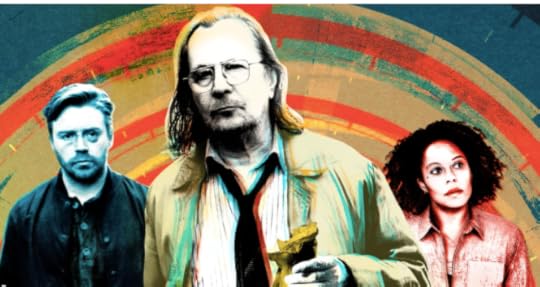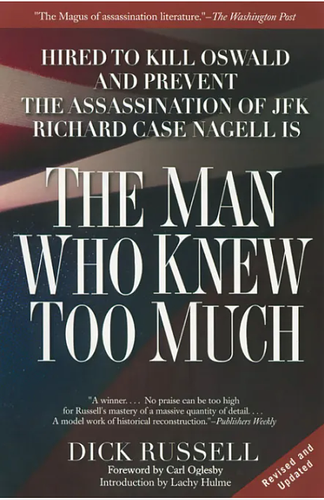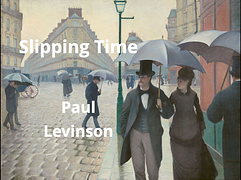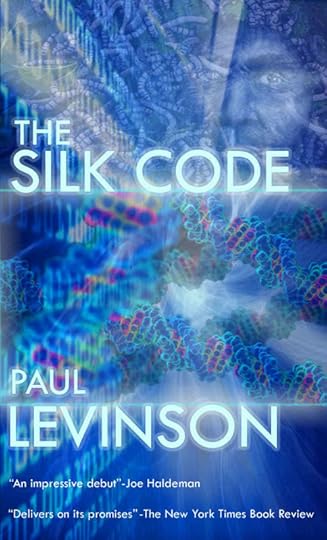Paul Levinson's Blog: Levinson at Large, page 25
January 2, 2024
Podcast Review of the Who Killed JFK podcast, Episodes 6-8
Welcome to Light On Light Through, Episode 367, in which I review the Who Killed JFK? podcast, episodes 6-8.
Read this review (written review of episode 8, with links to written reviews episodes 6 and 7)
Podcast review of Who Killed JFK? Episodes 1-5
Dick Russell's The Man Who Knew Too Much
Paul Levinson's books ... Paul Levinson's music
December 29, 2023
For All Mankind 4.8: Sergei and Margot, Ed and Alex

A really excellent episode 4.8 of For All Mankind up on Apple TV+ today, that develops some crucial personal relationships.
[Spoilers ahead ... ]
Let's start with Sergei and Margot. They loved each other, in addition to and making possible all the space stuff they managed to work on together in previous episodes. Like just about everyone else, Sergei here in the U.S. thought Margot had died in the bomb blast at NASA. But not like everyone else, he's deeply thrilled, with no mixed feelings, to learn she didn't die, and she's back here at NASA. His meeting her outside the diner, to warn her that she can't go back to the Soviet Union, was one of the best scenes in the series. The build up to that, and Sergei's involvement of Aleida, was also good to see. One of the things that has made For All Mankind so appealing all along is that the personal relationships that get our species out into space are just as important as the science and the politics.
And that was the case on Mars as well as on Earth in episode 4.8. The good guys -- Ed and Dev -- need to get the Discriminator into the equipment on the ship that will be remote steering the asteroid. The Discriminator will move it towards Mars not Earth. But getting that Discriminator in the right place is not easy, for a variety of reasons. The solution to one of the unexpected problems comes from Alex, Ed's young grandson, who is small enough to crawl through a passageway and retrieve the misplaced Discriminator. This not only allows Dev and Ed's plan to proceed, but gets Alex and Ed finally on the way to a good, loving relationship.
I haven't said anything about the alternate history in episode 4.8, because there was next to none. But it was fun to see Spiro T. Agnew's name up on a high school in the Texas town that Sergei is now living in. Agnew of course resigned as Nixon's Vice President in our own reality rather than stand trial on criminal charges. Good alternate history always plays games with villains as well as heroes.
Chuck Todd and Paul Levinson talk Alternate History, including For All Mankind
See also For All Mankind 4.1: Back in Business and Alternate Reality ... 4.2: The Fate of Gorbachev ... 4.3-4.4: The Soviet Union in the 21st Century, On Earth and Mars ... 4.5: Al Gore as President and AI ... 4.6: Aleida and Margot ... 4.7: Dev on Mars
And see also For All Mankind 3.1: The Alternate Reality Progresses ... 3.2: D-Mail ... 3.3-3.4: The Race
And see also For All Mankind, Season 1 and Episode 2.1: Alternate Space Race Reality ... For All Mankind 2.2: The Peanut Butter Sandwich ... For All Mankind 2.3: "Guns to the Moon" ... For All Mankind 2.4: Close to Reality ... For All Mankind 2.5: Johnny and the Wrath of Kahn ... For All Mankind 2.6: Couplings ... For All Mankind 2.7: Alternate History Surges ... For All Mankind 2.8: Really Lost in Translation ... For All Mankind 2.9: Relationships ... For All Mankind 2.10: Definitely Not the End
Paul Levinson's books ... Paul Levinson's music
December 28, 2023
Bodies: Stick With It

Well, I finally finished watching Bodies on Netflix, having watched the first five last month, and the final three episodes last night. And that was because the first five episodes didn't make much sense -- actually, hardly make any sense to me at all -- but the final three episodes brought it all together, in a way that respected all the paradoxes of time travel, which, as I always say, is crucially important in a time travel story.
The set-up was great -- the same body turning up in the same place, in four different times -- 1890, 1941, 2023, and 2053. Even with time travel, how could that happen?
[Some spoilers follow ... ]
We find out in the final three episodes -- someone is attempting to travel to the past, a police detective is trying to stop him and fires her gun just as he starts to time travel. The result splits his body into four bodies, each with a bullet in his head. And that's when the overall story started to make sense to me, and got me glued to the screen.
Before that happened, there at least were four good period pieces involving the detectives on the case in 1890 (Victorian), 1941 (World War II), 2023 (current), and 2053 (post-huge-bomb-blast) London. The plot that then fully emerges in the final three episodes follows the central villain of the story from 2053 to 1890 to set in motion a series of events that results in his younger self setting off the bomb that leads to 2053. Once our heroes understand this, their goal is to puncture the loop that this villain has so painstakingly created.
That's of course no easy thing, and it shouldn't be, which makes the ending all the more satisfying. The fix has to be put in motion in 1890, and percolate with just the right people in just the right places in subsequent times, and all of that comes off like clockwork. The 2053 detective and the 2023 detective (aged 30 years in 2053) travel back in time and have all the necessary conversations.
I've recently enjoyed two time travel stories (Novikov Windows and The Way Home) that rely on Novikov's principle that the past cannot be altered. I said in my reviews of each that I prefered time travel scenarios -- as a reader, viewer, and author -- in which the past could be changed. I'd highly recommend Bodies as a fine example of putting that scenario into a complex, thoroughly engaging story.
here's a little time travel story, you can read for free

here's the first novel in the Sierra Waters time-travel trilogy
December 27, 2023
Who Killed JFK? Episode 8: Not Lee Harvey Oswald

Here are the highlights:
The package that Oswald carried into the Texas Book Depository on the day of the assassination was too small to fit the rifle that killed JFK, even if disassembled, according to a witness (interviewed by Reiner in 2023) who traveled with Oswald to work that day.More than one witness places Oswald in the cafeteria at a time too close to get back up to the 6th floor, from where at least some of the three bullets were fired.Oswald's behavior after the assassination makes no sense from someone trying to get away.Now these details, added to what we heard in earlier podcast episodes about why some highly placed people at the CIA, the Mafia, and Cuban exiles wanted to see JFK dead, plus the forensic evidence of at least one of three bullets coming from in front of the JFK Limo, i.e., not from the Texas Book Depository, where Oswald was, make a case that, if I were on a jury trying Oswald for this crime, I would have more than enough evidence or lack of evidence to find him not guilty.But, of course, as we know, Oswald never got to trial, because Jack Ruby killed him. So Oswald turned out not just to be just a patsy -- a troubled but innocent man blamed from the assassination of John F. Kennedy -- but a patsy who paid for that role with his life. Next week, we'll learn more about Jack Ruby's role in all of this.
And as I said before, I hope, by the end of these rivering podcast episodes, that we learn why the President's brother, Robert F. Kennedy, put up with all of this, only to be assassinated himself.
See also Who Killed JFK? A Review of the First Three Episodes of this Podcast ... Episode 4: The Real Manchurian Candidate ... Episode 5: Sheep Dipped ... Episode 6: The Richard Case Nagell Case ... Episode 7: The Assembled Killers
Paul Levinson's books ... Paul Levinson's musicDecember 26, 2023
Slow Horses 3.6: Winners and Losers, Part 2

Well, I was right in my prediction last week about who else on our Slow Horses team would bite the dust in the season 3 finale on Apple TV+ tonight.
[Spoilers ahead ... ]
And, indeed, no one on our team was killed. But I also predicted that Donovan would live, because the blood lust in current TV series logic that not everyone of the good guys can live had been satisfied with Ben Dunn's demise in last week's episode, and, alas, I was wrong about that. And Donovan would have been a good addition to our heroic anti-heroic team.
But on the bright side, that bald guy was killed in the failed attack on Standish, and so was the leader of the MI-5 team which under Tearney's orders were trying to kill the Slow Horses. And the women on our team had an especially good night, playing a decisive role in the victory back at the Park.
I would rate this season as the best so far, with three back-to-back episodes of nearly nonstop action rounding out the short season of six. Even Ho tried to get into the action, with his vehicle. It wasn't needed, and gave Lamb yet another chance to bad-mouth anyone on his team, but it did show that Ho's heart was in the right place, using whatever weapon was at hand to try to save the day. And it wasn't his fault that smashing into the house to shake up the bad guys inside was no longer needed.
What's needed now are more episodes of this most excellent series, and they can't come along fast enough for me. I'll see you back here next year as soon as they're back on the screen.
See also Slow Horses 3.1-3.2: Beatles Level ... 3.3: The Meaningful Difference Between "The" and "A" in the UK ... 3.4: "Clear the Board" ... 3.5: Winners and Losers, Part 1
And see also Slow Horses 2.1-2.2: Do Horses Eat Ramen? ... 2.3: Faster Than You Think ... 2.4-2.5: Lamb Firing On All Cylinders ... Slow Horses 2.6: Heralds of Humiliation
And see also Slow Horses 1.1-2: Fast-Moving Spy Thriller ... Slow Horses 1.3: The Fine Art of Bumbling ... Slow Horses 1.4: Fine New Song by Mick Jagger ... Slow Horses 1.5: Did You Hear the One About the ... Slow Horses 1.6: The Scorecard
Paul Levinson's books ... Paul Levinson's music
Leave the World Behind: Educated Apocalypse

I've seen Leave the World Behind, up earlier this month on Netflix after a limited release in theaters in November, described as a horror movie, and, even more often, said in reviews to be horrible. I think it's neither. It's an apocalypse narrative, happening in real time, and based on science and tech. And I thought it was quite good.
Here's what I most liked about it:
Clay Sandford (played by Ethan Hawke) is a professor of English & Media Studies. Ruth Scott (Myha'la) says she never has been able to figure out what Media Studies is. I'm a professor of Communication and Media Studies (at Fordham University), and I sometimes agree.As the apocalypse unfolds, self-driving Teslas are smashing into one another and blocking the entrance to a highway.Sandford's daughter Rose watches The West Wing -- but only the Aaron Sorkin episodes.The same daughter loves Friends.Now admittedly none of that has much to do with the plot, but, hey, I believe in getting whatever you can from a movie, and the plot wasn't too bad, either. Without giving anything specific away (so I don't have to warn you about spoilers), the apocalypse hinges on getting people even more at each other's throats than they already are in our reality today, and the solution is only attainable if they/we learn to work together. That's a crucial lesson, given what's going on day by day in the world around us.
I think the characters worked well together. They each had a believable story, and one which was well synched to their age. The acting was excellent. Every person in the cast, ranging from Julia Roberts to Myha'la (whom I hadn't seen before) put in a convincing performance, not easy when you're playing a character in a story about the end of the world as we know it. So I say kudos to Mr. Robot's Sam Esmail, who directed and wrote the movie, based on Rumaan Alam's novel.
Chuck Todd interviews Paul Levinson about Alternate Histories
Podcast Review of Maestro
Welcome to Light On Light Through, Episode 366, in which I review Maestro, the Leonard Bernstein biopic.
Read this review.
Links to some of what I mentioned in the podcast:
1955 Edward R. Murrow Person to Person interview with Leonard Bernstein 1967 Inside Pop: The Rock Revolution (CBS special with Bernstein)Paul Levinson's books ... Paul Levinson's music
December 24, 2023
Who Killed JFK? Episode 7: The Assembled Killers

Given the depth of the pain I and everyone I know felt about the assassination of JFK in November 1963, it's hard to fathom how many different people fervently wanted it. The seventh episode of the Who Killed JFK podcast with Rob Reiner and Soledad O'Brien makes the case for three groups, in particular: the CIA, Cuban exiles, and the Mafia.
The animus that the CIA and exiles from Castro's Cuba had for JFK has already been convincingly presented in prior episodes of this pathbreaking podcast. In episode 7, the focus is on the Mafia, which had two reasons to hate JFK. First, Castro's takeover of Cuba resulted in the Mob's Caribbean Las Vegas being extinguished, which cost them untold millions of dollars. JFK's move towards peace and defacto acceptance of Castro in Cuba after the Cuban Missile Crisis thus angered the Mob almost as much as it did the Cuban exiles and the bellicose CIA. Second, Robert F. Kennedy, appointed Attorney General by his brother, pursued an escalating attack on the Mafia, giving it a reason all its own to want JFK removed from office.
As this episode amply details, members of all three groups -- the CIA, Cuban exiles, and the Mafia -- were in Dallas the day that JFK was assassinated. Are we to believe that that was just coincidence? Not likely. And one CIA operative in particular is especially notable: E. H. Hunt, who achieved infamy a decade later as one of the architects of the Watergate break-in that brought down Nixon.
As Reiner aptly has put it more than once, lots of chess pieces were being moved around in the months preceding JFK's assassination. All of which to insure that JFK was killed, and the blame placed with none of the three groups that were responsible.
The proposition that Lee Harvey Oswald was indeed the patsy that he proclaimed himself to be right after the assassination rings ever more true.
See also Who Killed JFK? A Review of the First Three Episodes of this Podcast ... Episode 4: The Real Manchurian Candidate ... Episode 5: Sheep Dipped ... Episode 6: The Richard Case Nagell Case
Rebel Moon, Part 1: Galactic Heroes and Villains

Just saw Rebel Moon, Part 1 on Netflix. It's a two-plus-hour movie with touches of the Star Wars, Dune, and Foundation universes, but a story all its own. And it's just Part 1. Which if we're comparing it to Stars Wars, means Rebel Moon is in effect two movies. I very much enjoyed the first one, and I look forward to the second.
[Spoilers ahead ... ]
Here's what's going on: There's a Nazi-like empire whose King and Queen have been assassinated, leaving those in charge intent of exterminating the rebels. The action takes place on a handful of planets strewn across space. There are robots (including one robot in particular, capable of feeling), cybernetic mixes of organic/electronic, natural beings of all shapes and sizes, and plain old-fashioned human beings including some who are more than plain.
A lot of the movie is focused on a team of heroes. The recruitment of each provides pretty good stories in themselves. My favorite was Tarak, a character who looks like a Native American, shows his prowess riding a fierce bird, reminiscent of the dragon-riders in Game of Thrones and House of the Dragon, and indeed Tarak is played Staz Nair who played Qhono in Game of Thrones.
There are lots of exciting battles, and not all the heroes survive. That's always a big plus, because it keeps you on your toes. And there are other surprises as well. The two biggest are Kai turning on the rebel team. Given that he's played by Charlie Hunnam, who played such a shining hero/anti-hero in Sons of Anarchy, Kai's selling out the team as the smart move was especially jolting. No way Jax would have done that.
But the even bigger surprise was Kora. We first see her at work on a farming planet, where she soon demonstrates her martial skills. But by the time the movie is over, we're seeing on the screen one of the most effective fighters ever to take on dozens of fighters in rapid succession and sometimes at once. And we also learn at the end that Kora is actually Arthelais, daughter of the tyrannical Regent of the Empire, Balisarius (poor choice of name, too close to Belisarius, the real last great Roman general on our planet, who already provided inspiration for the name Bel Riose, the last great general of the Empire in Isaac Asimov's Foundation and Empire and appearing in the second season of Foundation on Apple TV+). But the reason that Kora/Arthelais has such prowess as a fighter is that she carefully trained a human weapon by her father.
The two hours went by quickly, and my only regret was that I couldn't watch the second two right there and then. I'll certainly be back here in April 2024 when I do.
Levinson at Large
- Paul Levinson's profile
- 340 followers






